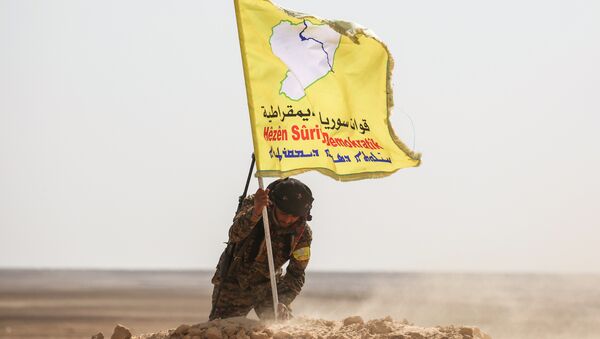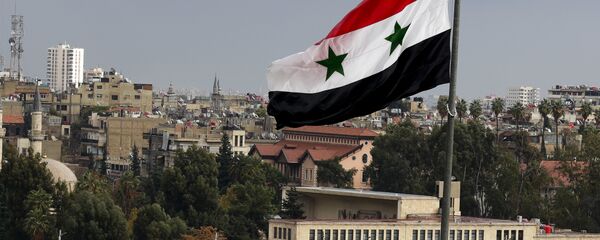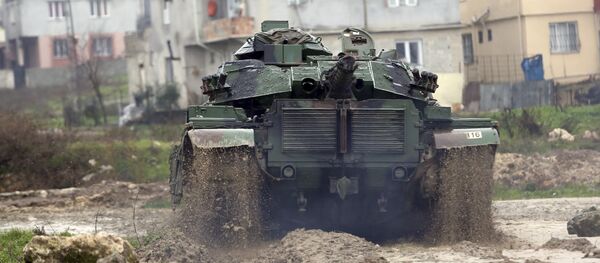Turkey has launched an offensive in northern Syria against the Kurdish forces Ankara considers terrorists. The operation dubbed "Olive Branch" started with airstrikes on Kurdish targets in Afrin on Saturday and Prime Minister Binali Yildirim confirmed Sunday the beginning of a ground offensive in the area.
The situation on the Syrian-Turkish border has become tense recently, with the Turkish armed forces shelling the positions of the Syrian Kurdish People's Protection Units (YPG), which it considers an affiliate of the Kurdistan Workers' Party (PKK), designated as a terrorist organization in Turkey and several other countries.
Operation Olive Branch is not the first time Turkey has used military force against Kurdish forces in northern Syria.
Euphrates Shield
In March 2017, Turkey unexpectedly decided to end its Euphrates Shield Operation, which kicked off on August 24, 2016 with the proclaimed goal of clearing the Syrian border town of Jarablus and the surrounding area from Daesh.
Announcing the end of the operation, Turkish Prime Minister Binali Yildirim said the operation had been "successful" and this is why it was finished. In turn, the Turkish National Security Council pointed out that the operation was successful in terms of ensuring national security, including preventing the threat from Daesh.
READ MORE: Turkey Will Continue Euphrates Shield Op in Syria's Afrin, Manbij — Erdogan
According to analysts, Turkey failed to achieve all of the goals set forth in Operation Euphrates Shield.
"Turkey has been unable to achieve all of its goals as part of Operation Euphrates Shield since the PKK and the YPG received support in the region," Turkish security and anti-terrorism expert Abdullah Agar said in an interview with Sputnik in March 2017.
The possibility also remained that Turkey could launch a new campaign concerning the Kurdish problem, experts said.
"But this [the results of the Euphrates Shield] does not mean that Ankara will abandon its plans to clear Syria from Kurdish terrorists in the long run," Volkan Ozdemir, director of Turkey’s Institute for Energy Markets and Policies (EPPEN), commented to RBK in March 2017.
Kurdish Problem
Kurds control two large areas in northern Syria. The first is the area spanning from Manbij in western Syria to the Turkish border in the north and Raqqa in the south. The second is Afrin Canton in northern Syria, one of the four cantons of Rojava, a de-facto autonomous Kurdish region established in Syria.
The Syrian Kurds wants to unite the two areas and create an autonomous state, similar to Iraqi Kurdistan in Iraq, where an independence referendum took place last year, which resulted in worsening tensions between Baghdad and the Kurdistan government.
READ MORE: Ankara to Prevent All Military Support to Syrian Kurds' YPG Militia
Turkey has strongly opposed the idea of a Syrian Kurdistan. The reason is Ankara’s longtime concern that a Kurdish autonomy in Syria would inspire similar ambitions among Kurds in Turkey.
Another problem for Turkey is the fact that the Syrian Kurds are an ally of the United States, which has repeatedly increased differences between Ankara and Washington. The first US military instructors arrived to train Kurdish units in Syria in 2015 since Washington believed Syrian Kurds to be the most reliable ally in the fight against Daesh and protecting American interests in the region.
Earlier this month, the Asharq Al-Awsat newspaper reported that the US is planning steps toward providing a Syrian Democratic Forces-controlled area in northern Syria's eastern Euphrates area three times the size of Lebanon with diplomatic recognition. Citing an unnamed senior Western official, the newspaper said that Washington is planning a set of measures which would eventually lead to diplomatic recognition of the Kurdish area.
The issue of Kurdish autonomy is also a point of serious concern for Damascus, as the possible Kurdish autonomy in northern Syria would prevent the restoration of country’s territorial integrity and sovereignty. It is also a problem for Iran, as the creation of Syrian Kurdistan would risk immediately revitalizing the idea of Iranian Kurdistan.
"Turkey and the coalition of Syria and Iran have similar interests when it comes to the Kurdish issues. All of them do not want a Kurdish autonomy in Syria," Gevorg Mirzayan, Associate Professor at the Department of Political Science of the Finance University under the Russian Government, wrote in an analysis in July 2017.






